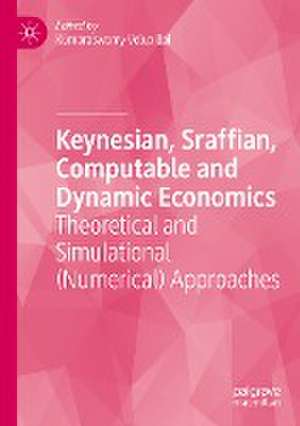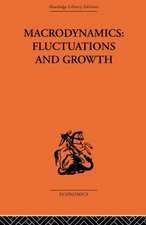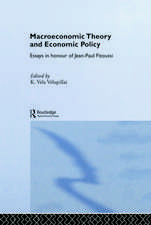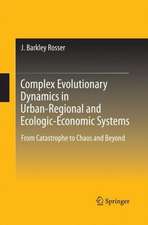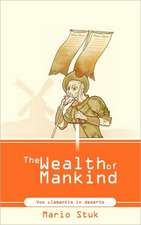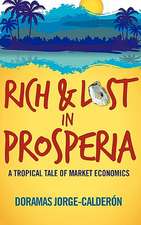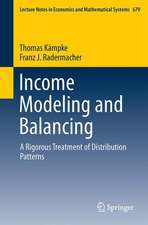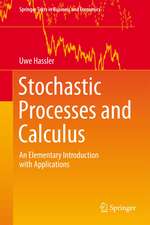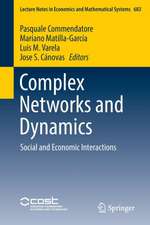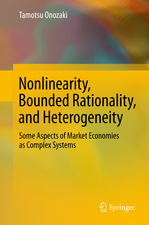Keynesian, Sraffian, Computable and Dynamic Economics : Theoretical and Simulational (Numerical) Approaches
Editat de Kumaraswamy Velupillaien Limba Engleză Paperback – 8 mar 2022
This book aims to challenge orthodox ideas and provide a lens through which to honour the work of Stefano Zambelli. It will be of relevant to students and academics interested in economics.
| Toate formatele și edițiile | Preț | Express |
|---|---|---|
| Paperback (1) | 896.52 lei 6-8 săpt. | |
| Springer International Publishing – 8 mar 2022 | 896.52 lei 6-8 săpt. | |
| Hardback (1) | 901.88 lei 6-8 săpt. | |
| Springer International Publishing – 8 mar 2021 | 901.88 lei 6-8 săpt. |
Preț: 896.52 lei
Preț vechi: 1093.31 lei
-18% Nou
Puncte Express: 1345
Preț estimativ în valută:
171.55€ • 178.76$ • 142.04£
171.55€ • 178.76$ • 142.04£
Carte tipărită la comandă
Livrare economică 03-17 aprilie
Preluare comenzi: 021 569.72.76
Specificații
ISBN-13: 9783030581336
ISBN-10: 3030581330
Ilustrații: XVII, 444 p. 67 illus.
Dimensiuni: 148 x 210 mm
Greutate: 0.6 kg
Ediția:1st ed. 2021
Editura: Springer International Publishing
Colecția Palgrave Macmillan
Locul publicării:Cham, Switzerland
ISBN-10: 3030581330
Ilustrații: XVII, 444 p. 67 illus.
Dimensiuni: 148 x 210 mm
Greutate: 0.6 kg
Ediția:1st ed. 2021
Editura: Springer International Publishing
Colecția Palgrave Macmillan
Locul publicării:Cham, Switzerland
Cuprins
1: Introduction.- 2: Intuitions about Welfare – Under the Constraint of Computability.- 3: Sraffa, Keynes and a New Paradigm.- 4: On the Meaning Maximization Doctrine: An Alternative to the Utilitarian Doctrine.- 5: A Generalization of Sraffa’s Notion of “Viability” in a ‘Land Grabbing’ Context.- 6: The Sea Battle Tomorrow: The Identity of Reflexive Economic Agents.- 7: Production, Innovation and Disequilibrium.- 8: The Non-Robustness of Saddle-Point Dynamics: a Methodological Perspective.- 9: The Economic Intuitions at the Base of Stefano Zambelli’s Technical Contributions.- 10: Foresight – The Foreseeable Future.- 11: Uniqueness in Planar Endogenous Business Cycle Theories.- 12: Nonlinear Endogenous Business Cycles: Zambelli-Goodwin Excursions in Cellular Automata Worlds.- 13: Chopping Off to Compute Sraffa’s Standard Ratio.- 14: The Noisy Dynamics of Finance contrasted with the Complex Dynamics of Biology.- 15: Observations on Computability, Uncertainty and Technology.- 16: Marx and the Other Sraffa: The Insignificant Empirical Effect of Price-Value Deviations on Economic Aggregates.- 17: Corn Model, Subsistence Economy and the Empirical Economy.- 18:The Zambelli Attractors of Coupled, Nonlinear Macrodynamics and Knot Theory.
Notă biografică
Kumaraswamy (Vela) Velupillai is a retired economist living in Stockholm, Sweden. He has been a Professor of Economics at various universities in Europe, USA, India and South America. He is a graduate of Kyoto, Lund and Cambridge Universities. His main interests are in Computable Economics, Macrodynamics and History of Mathematical Economics.
Textul de pe ultima copertă
This book explores an alternative approach to the conventional, market-based, view of economic theory and economic policy, at theoretical, numerical and applicable levels. The chapters provide a theoretical, empirical, and algorithmic approach to marcodynamics, Sraffian economics, and current policy issues. Post-Keynesian macroeconomics, business cycle theory, the trade cycle, microfoundations, and the Philips Machine are also covered.
This book aims to challenge orthodox ideas and provide a lens through which to honour the work of Stefano Zambelli. It will be of relevant to students and academics interested in economics.
This book aims to challenge orthodox ideas and provide a lens through which to honour the work of Stefano Zambelli. It will be of relevant to students and academics interested in economics.
Caracteristici
Uniquely interrogates the four points of Keynesian, Sraffian, Computable and Dynamics in the context of economic theory or applied economics
Considers Sraffian ideas on laws of returns under increasing and non-competitive conditions
Presents computable ideas of dynamics in Keynes and, dynamics in general, in a non-orthodox economic context
Considers Sraffian ideas on laws of returns under increasing and non-competitive conditions
Presents computable ideas of dynamics in Keynes and, dynamics in general, in a non-orthodox economic context
